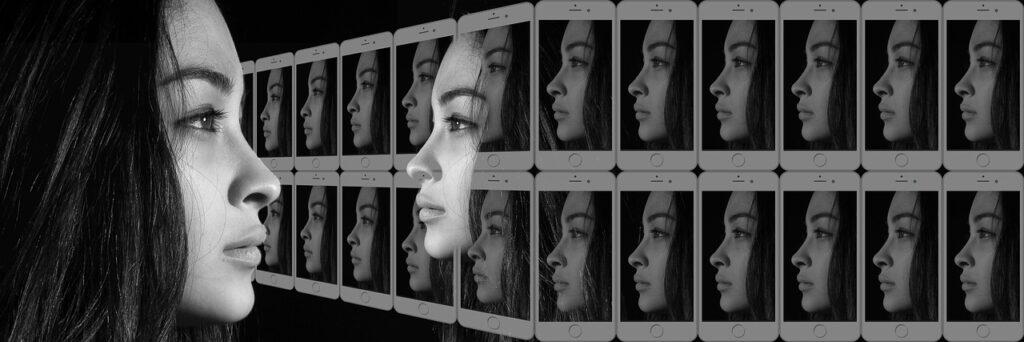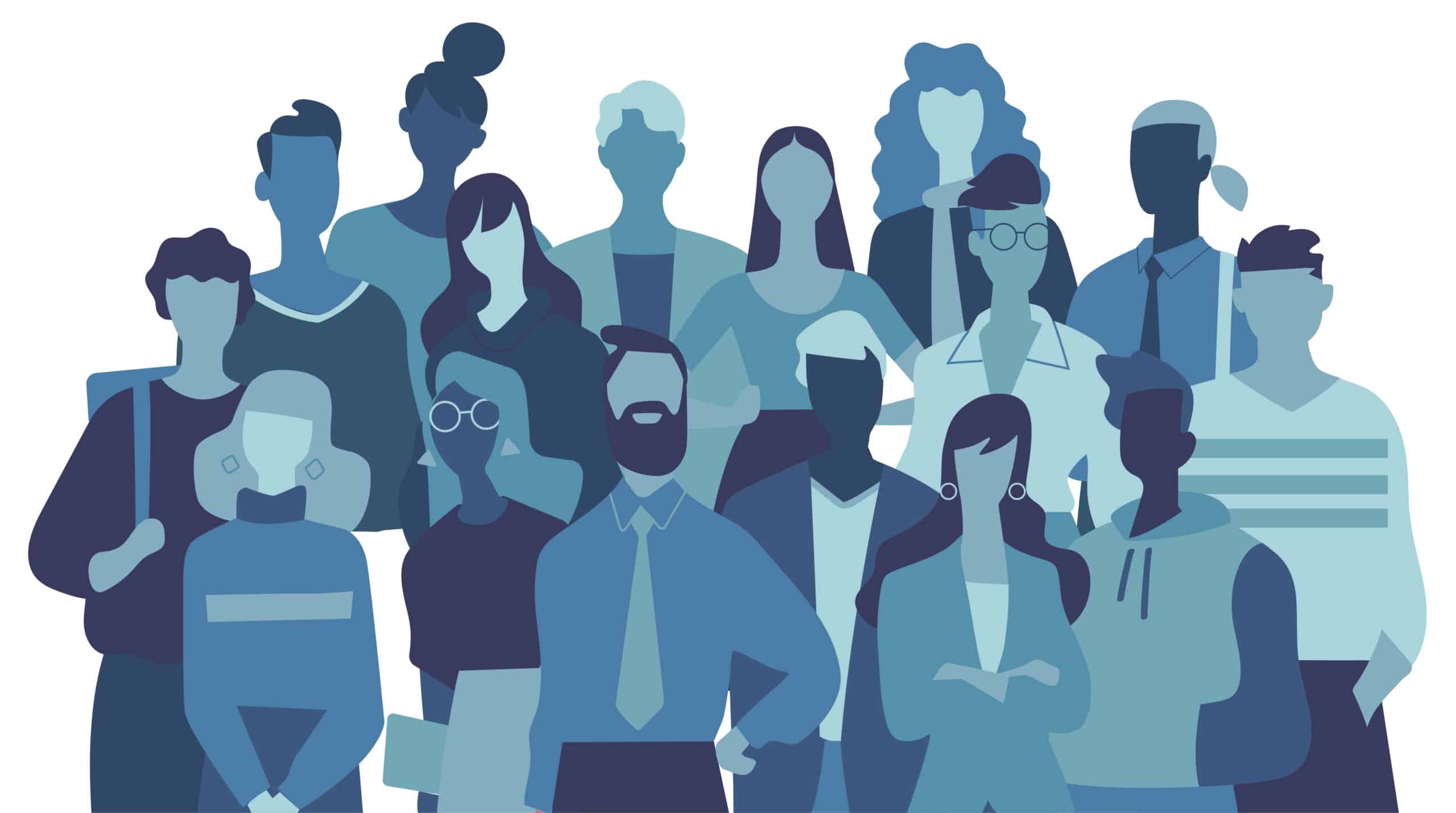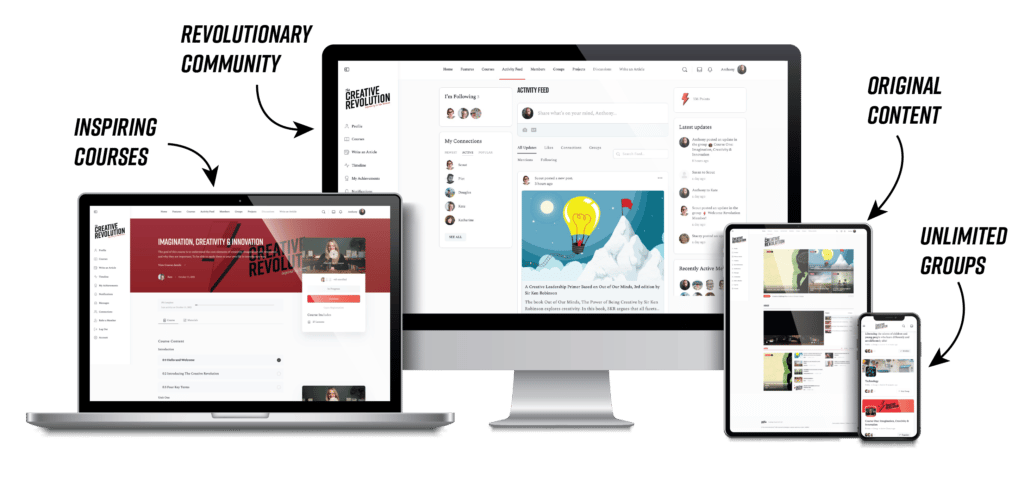For many of us, we see our online lives and offline lives as different, but children are growing up with technology and the internet and for them there isn’t a difference; online life and offline life is just life
NSPCC Tweet
In Imagine if… Creating a Future for Us All, SKR and I explore the idea that we all exist in two worlds: the world around you, the physical world that was here long before you were born and that will be here long after you die (we hope), and the world within you, the world of inner thoughts and emotions. In western cultures we create a divide between these two worlds, but they are intimately intertwined: who you are in the inside is shaped by your experiences of the world around you, and how you experience the world around you is informed by who you are on the inside. SKR loved to quote the poet Anais Nin: “I don’t see the world as it is, I see it as I am.”
This phenomenon has been true for all of human existence. Our ancestors held different opinions and different values than we do because the world they lived in was so different to ours. Take food: our great grandparents ate according to the seasons and how successful a harvest had been. Recipes were passed down from generation to generation. Their diets were unvaried, and locally sourced. In most places meat was rare to come by and difficult to preserve and so was an occasional treat. As a result, they ate less than we do, grew less than we do, and wasted less than we do. They held a deep respect for nature and lived in tune with the ebb and flow of one season to another. In modern times, the food we eat is sourced from all over the world. The United States, for example, receives fresh vegetables from more than 125 different countries. We consume meat in astronomical amounts, sometimes with every meal and we eat regardless of what is in season. We can do all this thanks to scientific advancements that range from freezers to pesticides to air travel. The result is we eat more, we want more, and we make more. We also eat food from other cultures regularly without really thinking about it, we cook less, we hand down recipes less, and we hardly notice the changing seasons. The point is, the era and culture you are born into, your socio-economic circumstances, your family dynamics, all play a role in shaping who you are and how you experience the world. We make sense of ourselves through our surroundings and our external influences, we always have done.
Now, for the first time in human history, we also exist within a third, new(ish) world: the virtual world. Our young people exist within this world more than the adults in their lives do, and this means that the generations rising now (Gen Z – born in the mid 1990s to around 2010 and Gen Alpha – born after 2010) are the first generations to be developing their inner worlds with as much influence from the virtual world as the physical world.
Over time we have slipped into our virtual lives almost seamlessly. Since the advent of the internet and the world wide web, our lives have been transforming, slowly at first and now at a pace we hardly notice. The advent of social media began to digitise our social lives in the early 2000s, but smart phones put them in our pockets.
This is not a critique of the digital revolution. On the contrary, the majority of these developments have changed our lives for the better. For those of us who are millennial and older, we have been able to witness these changes first hand. We have collectively dropped our jaws at each new technology. For Gen Z and Gen Alpha however, the digital world is all they have known, and they spend much more time engaged in it than we do.
One estimate is that the average American teenager spends 7 – 8 hours a day in the virtual world. This means they spend as much time in the virtual world as they do the physical world. As a result, Gen Z and Gen Alpha are the first generations to be developing their inner worlds through the virtual world as well as the physical world. This is an unprecedented development in our evolution as a species, and we must urgently understand what it means.
I believe that we are sleepwalking into a situation that has serious implication for our shared and collective future. While it may seem as though social platforms are harmless ways to watch videos and keep up with friends, but our young people are doing so much more on them: they are building a sense of self, they are developing their identities, their sense of self-worth, their political opinions, and their values about life and the world.
These are things teenagers have always done, of course, but Gen Z (and soon Gen Alpha) are doing this in unchartered territories. They are coming of age in environments in which 87% of young people have applied a filter before posting an image, in which their role models are able to portray seemingly perfect lives that are in fact meticulously curated, in which you can appear to be five inches taller, or twenty pounds lighter than you really are, in which you can change your hair colour, or nose shape with the touch of a button, in which self-worth is defined by likes and shares.
There are benefits to all of this of course: through the metaverse young people can create social circles beyond their immediate physical surroundings, they can connect with peers from all over the world, they can experience different cultures and learn through a variety of platforms, they have autonomy, and control over self-image. Yet each of these comes with a caveat: while young people today have more access to information than any generation before them, this information is increasingly untrustworthy. While they may have the potential to reach people from a variety of backgrounds and beliefs, studies show that they tend to seek out people who share and reinforce their own beliefs. The rise of anonymous trolling means that they are exposed to bullying of a new magnitude.
So, what can we do? Well, the genie is out of the bottle – there is no going back to the days before social media and other virtual platforms took over our lives. Most parents, educators and carers of young people adopt a head in the sand attitude. Phrases like “I have no idea what TikTok is really, but my kids love it” or “I don’t know what they’re doing on their phones, but they’re on them all the time” are commonplace amongst parents of teenagers. Schools have blanket bans on personal devices and social medias. But we are past the point of these being acceptable approaches.
The National Society for the Prevention of Cruelty to Children (UK) writes that “for many of us, we see our online lives and offline lives as different, but children are growing up with technology and the internet and for them there isn’t a difference; online life and offline life is just life.” We have to start recognising the role the virtual world is playing in the lives of our young people.
In many ways, our role as adults is the same as it ever was: we have a responsibility to guide and nurture our young people as they develop through childhood, young adulthood, and into adulthood. We have the same age-old duty of supporting our children as they make sense of the world, encounter difficulties, face opposing opinions and values, and as they form a sense of self as a result. We must still be present to celebrate the milestones and the wins, to share the defining moments in whatever capacity we can. The difference is that now we have new environments in which to do this: environments that many adults do not understand. The reality of the young adult virtual world may be unfamiliar to us, but in order to appropriately support our young people as they develop, we have to make an effort to understand the worlds they are living in.
The goal is not to micromanage, stalk, or cramp the style of our kids – a big appeal of the metaverse is the independence it allows for young people – but as a start, we have to understand these environments and the impact they have on the developing mind. We must be aware of the risks, the pitfalls, the benefits, and the potential, just as we would any environment we allow our children to head into.
There is no time to waste, the older cohort of Gen Z is already out of school and filling the workplace, they are in their mid-twenties. Their younger counterparts are school aged, and they are suffering. We are evolving at a rate we struggle to keep up with, and in the face of this we cannot continue to do what we have always done.
Do you have, or do you work with teenagers and children who use social media? Have you noticed a difference in their experiences over your own or of that of your peers? How do you approach this?




